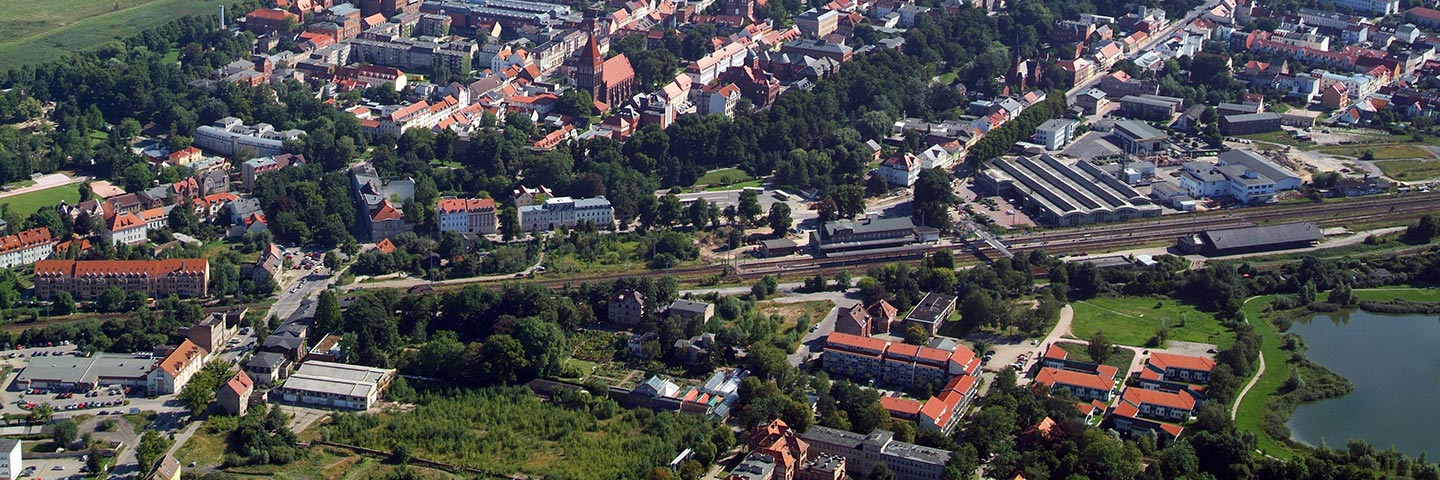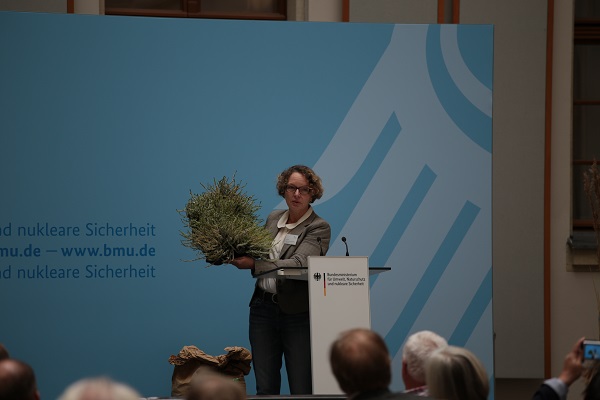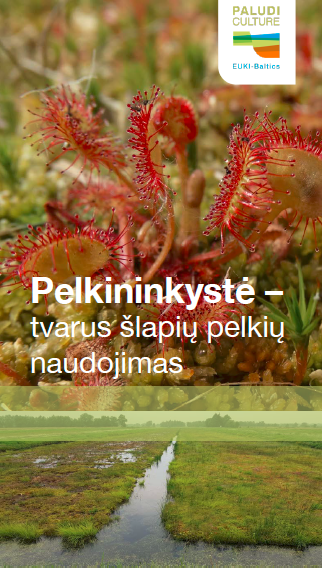News
2018
by NK
More moss for the GMC
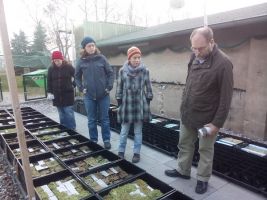
New peatmoss nursery established
17/12/18 Twelve peatmoss species are growing now in the new established nursery at the University of Greifswald. The project MOOSzucht intends to identify the species growing best under site conditions in (Northwest) Germany to reach high yields and produce large amounts of renewable biomass to substitute peat in horticulture. Nearly 500 samples of wild provenances across Europe – from Ireland to Estonia, from Sweden to Czech Republic and in Georgia – were collected within the MOOSzucht project as the base for research. Dr. Ulf Hauke from the German Federal Ministry for the Environment, Nature Conservation and Nuclear Safety, responsible for peatlands, visited the Greifswald Mire Centre on 17.12.18 including the new moss nursery.
by NK
Finally: permanent professorship!
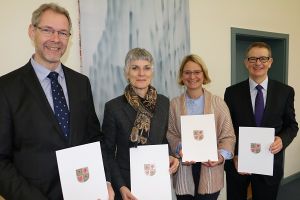
Greifswald peatland sciences enforced
17/12/2018 A new professorship of peatland sciences was agreed upon by the government of Mecklenburg-Western Pomerania and the University of Greifswald at 17th December. This gives a promising and reliable basis for future peatland sciences at Greifswald University, where peatland research started some 200 years ago and the university acts as a partner in the Greifswald Mire Centre since 2015. “The Greifswald peatland scientists analyse, how people and agriculture may make use of peatlands without exploiting them. This is what we want to support with a new professorship” explains Birgit Hesse, Minister of Education and Science in Mecklenburg-Western Pomerania. This state is one of Germany’s peatland-rich states. State and university are financing the new W3 professorship jointly with the Stifterverband der deutschen Wissenschaft (tbc) and the Michael Succow Foundation. Further information (German only) is provided in the the state’s press release and at the university’s website.
In the picture from left to right: Thomas Krüger (Chairman of the parliamentary group of SPD MV)), Prof. Dr. Johanna Eleonore Weber (Rector of Greifswald University), Birgit Hesse (Minister of Education and Science MV) and Dr. Jürgen Buchwald (State Secretary of Agriculture and Environment MV) (Foto: H. Lipski)]
by NK
Policy brief for COP24
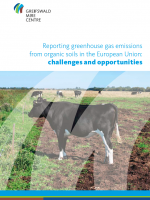
Reporting GHG emissions from organic soils in the EU
11/12/2018 Just in time for UNFCCC COP24 in Katowice, the Greifswald Mire Centre together with peatland scientists from 7 European institutions have produced a policy brief on reporting GHG emissions from organic soils in the EU. The brief covers the policy framework, weaknesses in reporting organic soils in National Inventory Submissions to UNFCCC, and recommendations for improvement. We have presented it at several events during UNFCCC COP24 in Katowice. The policy brief has been produced within the project INVESTIGATE funded under the European Climate Initiative (EUKI) of the German Federal Ministry for the Environment, Nature Conservation and Nuclear Safety (BMU). It has been co-ordinated by Alexandra Barthelmes (Greifswald Mire Centre).
by NK
Peatlands at COP24
Against peat fires and for the climate
10/12/2018 The Greifswald Mire Centre, together with partners from the Global Peatlands Initiative, co-organises several peatland events at the 2018 UNFCCC conference in Katowice. The side event „The trace of haze: Peat fires as local and global challenges“ at 6th December was coordinated by UN Environment and Greifswald Mire Centre, and hosted by the German Government. The session presented global experience on peat fires and showcased coalitions for peatland restoration, e.g. the Restoring Peatlands in Russia Project, which was awarded the UNFCCC “Momentum for Change” award in 2017. A side event at 7th December brought together multilateral environmental conventions such as Ramsar Convention, CBD, UNCCD and UNFCCC, and future joint action on peatlands was agreed. At 11th December, the lunch session „Stop eating peat“ co-organised by CMok, Wetlands International and GMC will bring attention of the Climate Hub Katowice to peatlands. We will also contribute to a side event on peatlands and Nationally Determined Contributions (NDC‘s) 12th December. Follow @greifswaldmoor on twitter for details on COP24!
by NK
Triple win for climate, people and the planet
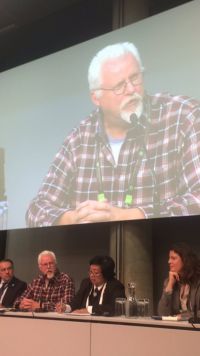
Tropical peatlands in focus at Global Landscape Forum
03/12/2018 Tropical peatlands are in focus of a high level event at the Global Landscapes Forum (GLF) 1st December 2018. With the Event Protecting Tropical Peatlands Together distinguished officials from the Republic of Congo, Indonesia, Germany and the Ramsar Convention joined forces for a better understanding of tropical peatlands and thus a better conservation and sustainable management. The session highlighted Indonesia and the Republic of Congo’s commitments to high level South South collaboration on management, restoration and protection of peatlands. Along with H.E. Siti Nurbaya, Minister of Environment and Forestry, Indonesia, and Arlette Soudan-Nonault, Minister of Environment and Tourism, Republic of Congo, also Hans Joosten (GMC) joined the session and shared his insights on priorities in peatland management. See the session here.
by NK
Strong signal from Berlin
Conference ‚Peatlands must be wet! Climate protection by peatland conservation‘
26/10/2018 ‚Peatlands must be wet!‘ was the key message of the conference on peatland and climate protection 26th October 2018 in the Ministry of Environment in Berlin. To comply with national and international obligations and minimise greenhouse gas emissions from peatlands by 2050, some 50,000 ha need to be rewetted annually. A large share could be transferred from ‚dry‘ agriculture and forestry to ‚wet‘ agriculture and forestry. The Project German Peatland Dialogue(National Climate Initiative) has facilitated exchange between farmers, water management authorities, nature conservation bodies, scientists and politicians, and stimulated progress in peatland management in the last three years. The final conference clearly showed what is needed: a clear political framework, financial incentives and compensation, brave entrepreneurs, and sound accompanying research. More information can be found in the press release on the Ministry of Environment.
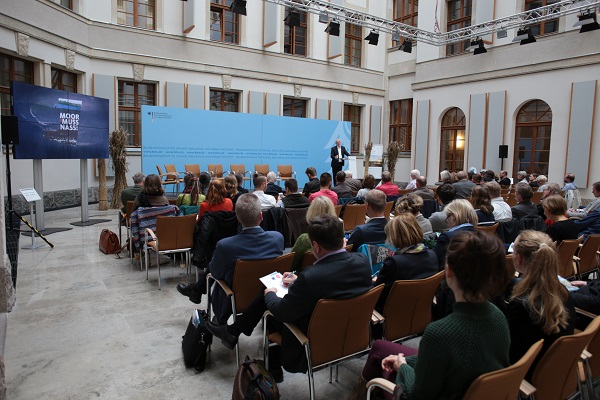
by NK
Sundew - sustainable in super size
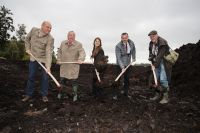
Europe's largest cultivation area is being set up
03/10/2018 Cultivating sundew for its medical purposes, is an endeavour Balazs Baranyai und Dr. Jenny Schulz have been pursuing for more than six years. Now, they are actually setting up the largest cultivation area for sundew in Europe - at Breesener Moor, a cut-over peatland within the biosphere reserve Schaalsee-Elbe (Mecklenburg-Western Pomerania). A water reservoir will be installed this autumn and a peat moss-sundew culture established in spring next year.
Six years ago both peatland scientists sowed first sundew seeds on a peat moss lawn, followed by numerous cultivations experiments. 2015 they succeeded in obtaining a sustainable sundew cultivation in combination with peat mosses and founded the PaludiMed GmbH – a first spin-off from the Greifswald Mire Centre. With the new cultivation area they bring pilot trials into large-scale production. Dr. Till Backhaus, Minister for Agriculture and Environment of Mecklenburg-Western Pomerania, opened the official ground-breaking ceremony in the Breesener Moor with numerous guests.
by NK
Big book donation to PeNCIL
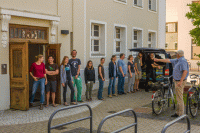
600 kg of peatland books arrived today
03/09/2018 After a long ride, Hans Joosten, John Couwenberg and Mira Kohl arrived today with a van full of books at the GMC. Professor R.S. (Dicky) Clymo (Queen Mary University of London, UK) has donated a large part of his personal library to our Peatland and Nature Conservation International Library (PeNCIL) . We feel deeply honoured and are very thankful. During the visit, Dicky Clymo received greetings and signatures of the General Assembly of the International Mire Conservation Group (IMCG) , which granted him Honorary Life Membership 31.08.2018 in Utrecht. Dicky Clymo is long-term IMCG supporter, editor of the journal Mires and Peat, and has influenced and stimulated generations of peatland scientists. In hope - studying peatlands for ever!
by NK
Minister meets mire ambassadors
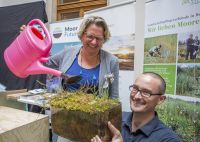
GMC, DVL and MoorFutures at the Open Day
25/08/2018 Federal Minister for Environment Svenja Schulze enjoyed rewetting a peatland at small scale. She is well informed about the importance of peatlands. At the Open Day 2018 in the Ministry of Environment, Tobias Dahms und Monika Hohlbein (both GMC) explained how peatlands and climate protection are connected in detail. The minister and her parliamentary secretary of state Rita Schwarzelühr-Sutter learnt about the Project MoorDialog and about the urgent need for action in the implementation of a climate-friendly, wet management of previously drained peatland sites. In particular, setting up demonstration facilities, their scientific monitoring, and removing constraining factors to wet(ter) peatland management were discussed. The GMC attracted many visitors with mires plants and products to its joint booth with the Deutsche Verband für Landschaftspflege (LPV).
by NK
Peatland degradation globally documented
IPBES publishes extended report
21/08/2018 The Assessment Report on Biodiversity and Ecosystem Services for Europe and Central Asia (IPBES/6/INF/6/Rev.1 ) was recently published as extended report by the Intergovernmental Science-Policy Platform on Biodiversity and Ecosystem Services (IPBES). IPBES is an intergovernmental body that provides politics with scientific advice, comparable to the Intergovernmental Panel on Climate Change (IPCC). Contributing authors of chapter 3 (Status, trends and future dynamics of biodiversity and ecosystems underpinning nature’s contributions to people) are Hans Joosten and Franziska Tanneberger (both GMC). The report sheds light on peatland distribution and degradation using data of the GMC’s Global Peatland Database and links climate destruction due to peatland degradation and biodiversity loss.
by NK
Indonesia and Western Pomerania in dialogue
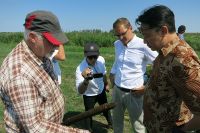
Ambassador on paludiculture tour
03/08/2018 To see how paludiculture looks in practice the Indonesian ambassador H.E. Dr. Arif Havas Oegroseno paid a visit to Western Pomerania following an invitation of the Greifswald Mire Centre.
Similar to Germany, Indonesia suffered huge environmental damage due to peatland drainage for agriculture. In Indonesia, large scale peat fires additionally worsened the situation and also caused severe health problems for the population. Today the country sees rewetting and paludiculture as a solution and is gathering information how to use peatlands wisely. Indonesia has recently set up a Peatland Restoration Agency and has rewetted in 2017 some 200,000 ha – as much as entire Europe in its history.
The GMC took ambassador Oegroseno to drained peatlands at polder Bargischow and rewetted peatlands at Anklamer Stadtbruch. Here, Patrick Dahlemann, Secretary of State for Western Pomerania welcomed the ambassador and joined him for a visit in a dense, productive reedbed under almost tropical temperatures. In the small village of Kamp the group observed the harvesting of cattail and learnt about traditional and innovative forms of paludiculture. At the site of the Wetland Products Foundation reed cutting companies from Anklam region, Rügen island and Schleswig-Holstein together with Dutch companies specialised in mowing machinery for wetlands shared their knowledge with the guests. Patrick Dahlemann welcomed this ‘peatland connection’ and stressed the potential of combining environmental and socio-economic benefits by implementing peatland rewetting and paludiculture.
In the cool historical buildings of Greifswald University, the prorector for Research and International Affairs Prof. Dr. Katharina Riedel introduced the ambassador to the history and main research topics of Greifswald University. Ambassador Oegroseno showed much interest in research cooperation and announced to explore possibilities for setting up an ERASMUS partnership. Further steps in cooperation were also discussed with the Michael Succow Foundation, where Prof. Dr. Michael Succow welcomed the ambassador.
by NK
Now in Estonian, Latvian, Lithuanian
Information material on paludiculture
28/06/2018 Leaflets on paludiculture are now available for download in Estonian, Lithuanian as well as in Latvian - here separately on paludiculture on bogs and on paludiculture on fens. The information material, originally edited by the Succow Foundation and the Greifswald Mire Centre, was edited and translated by Baltic peatland experts and the Michael Succow Foundation, pertner in the Greifswald Mire Centre within the project Paludiculture in the Baltics - Potential and Capacities for climate protection through productive use of rewetted peatlands. The project, sponsored within the European Climate Initiative, analyses whether drained peatland areas in the Baltic states can be rewetted and sustainably used, and - if so - which ones. These measures could effectively reduce CO2-emissions, create altenative sources of income and conserve peatlands as habitat for highly specialised species.
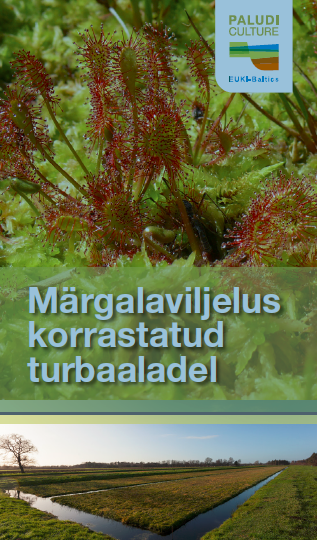
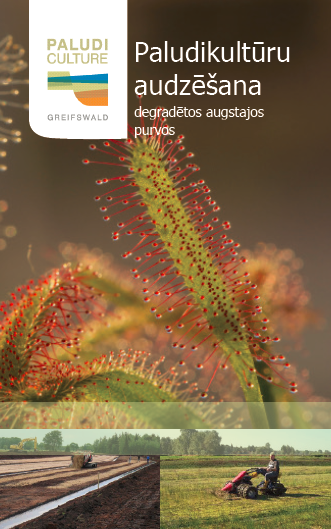
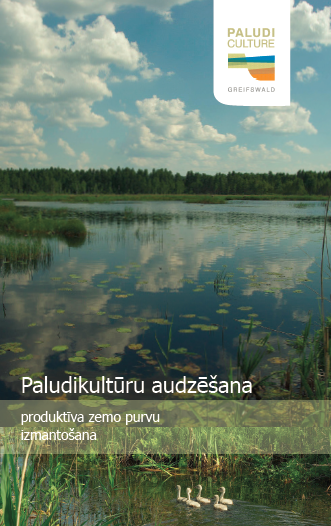
by NK
Understanding Polesie peatlands
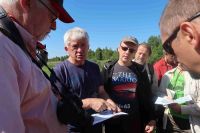
Fact finding mission to Belarus completed
28/05/2018 A small group of peatland scientists from GMC and International Mire Conservation Group (IMCG) just returned from southern Belarus. The group has discussed water management at Zvaniec Mire, one of Europe’s largest near-natural peatlands. The site holds about 25% of the world population of the globally threatened Aquatic Warbler. Recently, habitat conditions have deteriorated and the site is now classified as Important Bird Area (IBA) in danger. The group identified main directions of future monitoring and studies to improve water management. Together with experts from the Belarusian Academy of Sciences and the Lithuanian-Belarusian LIFE project on the Aquatic Warbler, concrete steps and increased cooperation was agreed to better understand and protect this and other fens in Polesie region.
by NK
Peat under water
Register now for workshop
04/05/2018 The programme for the upcoming peatland restoration workshop "Peat under Water" being held in north-eastern Germany from 5th to 6th September 2018 is now ready:
The workshop will cover carbon and nutrient biochemistry, GHG exchange as well as biodiversity and biotic development of flooded peatlands. Detailed information at www.wetscapes.de/peatunderwater. The deadline for registration is 1st June 2018.
by NK
100% Aquatic Warbler
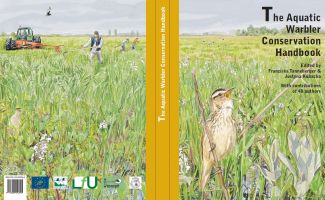
New handbook summarises ecology, management and conservation
14/04/2018 For twenty years the Aquatic Warbler Conservation Team (AWCT) is putting its effort into the threatened peatland species and there is quite some reason to celebrate. The team has compiled the Aquatic Warbler Conservation Handbook which was launched at the 20th anniversary celebration 12th-15th April in Brodowin (Germany). The book summarises the current knowledge on ecology, habitat management and conservation of the Aquatic Warbler including contributions of two GMC and long-term AWCT members – Franziska Tanneberger and Cosima Tegetmeyer. The AWCT is a small and informal network of experts for this mire species from almost all range countries – and a success story: Founded in 1998 in Brodowin by Martin Flade, who is its chairman until today, it promoted a Memorandum of Understanding for the protection of the globally threatened Aquatic Warbler (Acrocephalus paludicola) under the Bonn Convention (CMS), which was signed in 2003. The team has initiated 8 EU LIFE projects targeting the species’ conservation as well as numerous other projects. Annual AWCT expeditions to breeding or wintering sites are a tradition since the very beginning and help to form a dedicated, inspiring team.
by MK
Towards better reporting of emissions
EUKI workshop discussed organic soils as cross-cutting issue
06/04/2018 Greenhouse gas emissions from drained organic soils are among the largest sources from the Agriculture and LULUCF sectors in many European countries. However, reporting of drained organic soils to the UNFCCC is for many EU countries inaccurate and not fully compatible with the latest IPCC guidance. As a result, emissions reduction potentials related to organic soils are poorly addressed. The short-term project ‘Improving national GHG inventories for organic soils and mitigation potential of wet land use’ (INVESTIGATE) is funded by the European Climate Initiative (EUKI) to network and prepare further activities to tackle scientific and technical issues with respect to reporting GHG emissions. At a workshop in Greifswald 5th/6th of April 2018, peatland and national inventory experts from Finland, Danmark, Latvia, Ireland, Romania and Germany discussed recommendations for improving national inventories with regard to organic soils. It is planned to jointly prepare further research and policy activities at the EU level.
by NK
Brazzaville Declaration
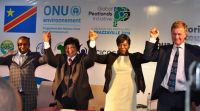
Ministers align for protection of the Congo Basin
23/03/2018 Good news for the protection of tropical peatlands at the Third Meeting of the Partners of the Global Peatlands Initiative 21st-23rd March in Brazzaville (Republic of Congo): Ministers of the Democratic Republic of the Congo, the Republic of the Congo and of Indonesia signed the Brazzaville Declaration for conservation and sustainable use of the world’s largest tropical peatland in the Congo basin. The peatland complex is estimated to be larger than England and to hold about 30 billion tonnes of carbon. This equals more than 15 years of carbon dioxide emissions from the United States. Moreover, the Congo basin is important for the region’s ecological stability and biodiversity. The Greifswald Mire Centre co-organised the meeting as a steering commitee partner of the Global Peatlands Initiative.
The photo shows from left to right: Mr. Amy Ambatobe Nyongolo (Minister of Environment and Sustainable Development, Democratic Republic of Congo), Arlette Soudan-Nonault (Minister of Tourism and Environment, Republic of Congo), Siti Nurbaya Bakar (Minister of Environment and Forestry, Indonesia), Erik Solheim (Executive Director, UN Environment)
by NK
De la fumée sur l’eau
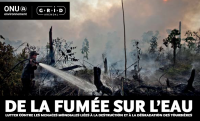
GPI report now in French
23/03/2018 'De la fumée sur l’eau': The Global Peatlands Initiative's report 'Smoke on Water' is now available in French. A first copy was presented to the Prime Minister of the Republic of Congo Clément Mouamba during the Third Meeting of the Partners of the Global Peatlands Initiative 21st-23rd March in Brazzaville (Republic of Congo). The Greifswald Mire Centre provided substantial text, various graphs, maps and the vast majority of illustrations from peatlands worldwide.
by NK
1 Mio US$ Indonesian Peat Price
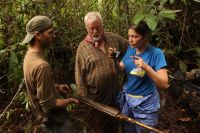
Consortium with Greifswald Mire Centre wins!
02/02/2018 Spectacular news for the scientists of the Greifswald Mire Centre at today's World Wetlands Day: The Indonesian government is awarding the Indonesian Peat Prize, endowed with 1 Mio US$ - and the Greifswald Mire Centre is part of the winning research consortium.
„The price gives credit to our work at the international level. It is evidence for the consortium's capacity and a chance for research, conservation and sustainable use of peatlands in Indonesia and worldwide." said Prof. Dr. Dr. h.c. Hans Joosten, peatland ecologist at the Institute of Botany and Landscape Ecology at Greifswald University. In Indonesia Joosten and his team are analysing greenhouse gas emissions, mire development and land use of peatlands since 2006.
Large scale and intensive farming of palm oil and pulp wood causes large problems in Indonesia. Extensive areas were drained for these monocultures. The consequences are degradation, land loss, extremely high greenhouse gas emissions and devastating peat fires. Over the last years these fires have caused thousands of deaths and gigantic damages within the country and the neighbouring regions. The Indonesian government is fighting the climate damaging effects with an ambitious programme, of wich the Indonesian Peat Prize is a part of.
